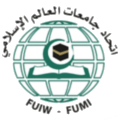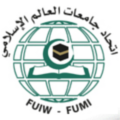January 2017
Imam Muhammad bin Saud Islamic University Rector receives ISESCO Director General
Dr Suliman bin Abdullah bin Hamoud Aba Al-Khail, Rector of Imam Muhammad bin Saud Islamic University (IMSIU), President of the General Council and Chairman of the Executive Council of the Federation of the Universities of the Islamic World (FUIW), received Dr Abdulaziz Othman Altwaijri, ISESCO Director General, ex-officio FUIW Secretary General, today morning in Riyadh, KSA. During this meeting, the
FUIW Prize on the theme: “Terrorism – Today’s Plague: Causes and Academic and Intellectual Solutions”
Seeking to promote scientific research in addressing developmental and civilizational issues of the Muslim World, and with a view to encouraging scientists and researchers in the Member Universities in valorizing their efforts and diligence, the Federation of the Universities of the Islamic World (FUIW), is pleased to call for nominations for its annual prize on the theme “Terrorism – Today’s
Journal of the Federation of the Universities of the Islamic World : Issue 8
The Muslim population of the SE Europe, excluding European part of Turkey, numbers ca. 9 millions, almost all of them being indigenous save for small immigrant Muslim minorities of Muslims in Greece and Romania (See Table I). The Balkan Muslim communities originated with the Ottoman presence in the region and for centuries their destiny was tied to the fortunes of
Guide to Quality and Accreditation for the Universities of the Islamic World
Quality is a priority issue within strategic planning in industrial, commercial and administrative sectors, in its being a prerequisite for business and market competitiveness. Besides, with the growing interest in the quality of educational output, quality and accreditation have become a stepping-stone towards enhancing educational systems, developing their contents and modernizing their means to better serve the recipient categories. In
Islamic Body for Quality and Accreditation
In accordance with the objectives of the FUIW’s charter seeking to upgrade and develop higher education and evaluate its performance to improve its quality and accreditation; and In response to the recommendation of the experts of ISESCO, ALECSO and the FUIW, calling for the establishment of an advisory body for quality and accreditation (Amman- Jordan: 17-19 September 2006); The FUIW’s
Strategy for the Promotion of University Education in the Islamic World
As the third millennium opens, the world is witnessing many social and economic changes as well as scientific and technological developments. The result is that modern societies have become faced with considerable challenges and growing needs in terms of education. This leads us to an important question: how can we keep faith to our constants and maintain our civilizational and












Recent Comments